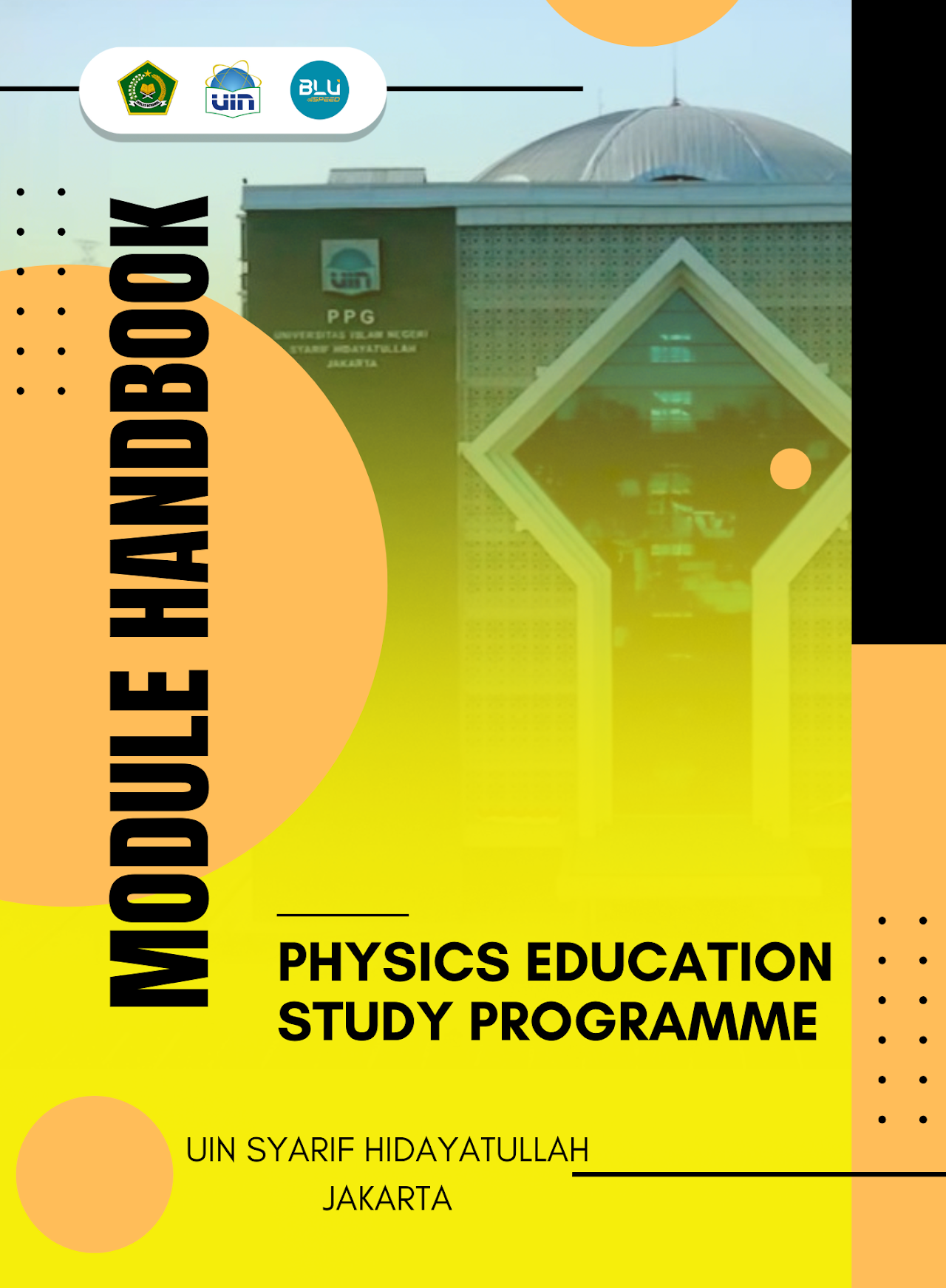MBKM 2021 Curriculum
The higher education curriculum of the Physics Education Program (Tadris Physics) at UIN Syarif Hidayatullah Jakarta is a set of plans and arrangements regarding the content, study materials, and teaching resources, along with their delivery methods and assessments. This curriculum serves as a guideline for organizing learning activities in the Physics Education Program under the Faculty of Tarbiyah and Teacher Training at UIN Syarif Hidayatullah Jakarta.
The Physics Education Program demonstrates its commitment to providing quality education for its students. In designing the curriculum, the program undertakes various efforts to ensure that the implemented curriculum aligns with the applicable procedures and regulations in higher education.
The program also adheres to the regulations set forth by the Ministry of Education and Culture of the Republic of Indonesia and the Ministry of Religious Affairs of the Republic of Indonesia during the curriculum development process. This ensures that the program meets national standards and produces graduates with the competencies required in the workforce.
By following the established procedures and regulations, the Physics Education Program at UIN Syarif Hidayatullah Jakarta ensures that its students receive high-quality education that meets the standards set by the government. This reflects the program’s commitment to delivering excellent education for its students.
Prospective Physics Educators/Teachers at the MA/Senior High School (SMA) level
Research Assistants in the field of Physics Education.
Prospective educators/teachers of Science (IPA) at the Junior High School (SMP/MTs) level.
Entrepreneurs in the field of education/physics.
ILO Physics Education Study Programme
Knowledge and understanding
1. Understand the fundamental concepts of education and learning theories in designing, implementing, and evaluating innovative physics instructions by leveraging Information and Communication Technology (ICT), and the surrounding environment.
2. Comprehend the concepts and principles of managing a physics laboratory by integrating technology and the environment.
3. Master mathematics, computation, and instrumentation to support the understanding of physics concepts.
4. Master the concepts of physics and the scientific mindsets of physics based on natural phenomena that support Physics learning in schools and master’s education programs.
5. Mastering the process of problem identification and appropriate Physics Education research methods as alternative problem-solving strategies, as well as techniques for writing scientific papers.
Autonomy and Responsibilities
Autonomy:
1. In the context of attitudes and values, freedom plays a role in various ways such as being responsible for work in the field of expertise independently (i) and internalizing the spirit of independence, struggle and entrepreneurship (j).
2. In general skills, freedom is expressed through independent performance (b), the ability to make decisions appropriately in the context of solving problems in their area of expertise (e), and managing learning independently (h).
3. In terms of specific skills, freedom can be seen in planning, implementing, and evaluating innovative physics learning (a), and conducting physics education research as a form of problem solving (d).
Responsibilities:
1. In attitudes and values, responsibility is emphasized in various ways such as contributing to improving the quality of social life (c), acting as a citizen who is responsible for the state and nation (d), and showing a responsible attitude towards work in his field of expertise independently (i).
2. In general skills, responsibility is demonstrated through the ability to be responsible for the achievement of group work results (g), and to supervise and evaluate the completion of work assigned to workers under their responsibility (g).
3. In specific skills, responsibility is expressed through planning, implementing, and evaluating innovative physics learning (a), and conducting physics education research as a form of problem solving (d).
Handbook Module
MH_FST6095102_BASIC BIOLOGY PRACTICUM
MH_FST6096202_BASIC CHEMISTRY PRACTICUM
MH_FST6097112_BASIC PHYSICS PRACTICUM I
MH_FST6097113_MEASUREMENT AND CALIBRATION SYSTEMS
MH_FST6097116_ADVANCED PHYSICS
MH_FST6097121_BASIC PHYSICS II
MH_FST6097122_BASIC PHYSICS PRACTICUM II
MH_FTK6011201_ISLAMIC EDUCATIONAL SCIENCE
MH_FTK6011203_EDUCATIONAL PSYCHOLOGY
MH_FTK6011206_INTRODUCTION TO THE SCHOOL FIELD I
MH_FTK6011207_INTRODUCTION TO THE SCHOOL FIELD II
MH_FTK6019101_PRACTICUM ON MEASUREMENT AND CALIBRATION SYSTEMS
MH_FTK6019102_LEARNING AND LEARNING PHYSICS
MH_FTK6019103_MATHEMATICAL PHYSICS I
MH_FTK6019104_THERMODYNAMICS I
MH_FTK6019105_CLASSIC MECHANICS I
MH_FTK6019107_ELECTRONICS PRACTICUM I
MH_FTK6019108_ELECTROMAGNETICS I
MH_FTK6019109_LEARNING STRATEGIES
MH_FTK6019110_LEARNING MEDIA (ANALOG)
MH_FTK6019111_MATHEMATICAL PHYSICS II
MH_FTK6019112_THERMODYNAMICS II
MH_FTK6019113_CLASSIC MECHANICS II
MH_FTK6019115_ELECTRONICS PRACTICUM II
MH_FTK6019116_ELECTROMAGNETICS II
MH_FTK6019117_COMPUTING PHYSICS
MH_FTK6019120_WAVE AND OPTICAL PRACTICUM
MH_FTK6019121_STATISTICAL PHYSICS
MH_FTK6019123_INTRODUCTION TO SOLIDS PHYSICS
MH_FTK6019124_INTRODUCTION TO NUCLEAR PHYSICS
MH_FTK6019125_QUANTUM MECHANICS
MH_FTK6019126_PHYSICS LEARNING EVALUATION
MH_FTK6019213_EDUCATIONAL STATISTICS
MH_FTK6019301_EARTH AND SPACE FOR SCHOOLS (Option 1)
MH_FTK6019302_ASTRONOMY/ASTROPHYSICS/APPLIED ASTRONOMY (Option 1)
MH_FTK6019303_FALAK SCIENCE (Option 1)
MH_FTK6019304_TEACHING OF PHYSICS FOR SCHOOL (Option 2)
MH_FTK6019305_RENEWABLE ENERGY (Option 2)
MH_FTK6019306_CONTROL SYSTEM (Option 2)
MH_FTK6019307_PHYSICS OF MATERIALS (Option 2)
MH_FTK6019308_SELECTIVE ESSAY BIOLOGY SMP (Option 3)
MH_FTK6019309_SMA/MA PHYSICS CAPITA SELEKTA (INTEGRATION) (Option 3)
MH_FTK6019310_NATIONAL AND INTERNATIONAL SCHOOL CURRICULUM (Option 4)
MH_FTK6019311_ADVANCED CORE PHYSICS (Option 4)
MH_FTK6019312_ADVANCED QUANTUM PHYSICS (Option 4)
MH_FTK6019313_PHYSICS APPLICATION PROGRAMMING (Option 5)
MH_FTK6019314_LEARNING SOFTWARE DEVELOPMENT (Option 5)
MH_FTK6019315_MANAGEMENT AND MANAGEMENT OF SCHOOL PHYSICS LABOLATORIES (Option 6)
MH_FTK6019316_LABOLATORY TECHNIQUES AND MANAGEMENT (Option 6)
MH_FTK6019317_PHYSICS INTERNSHIP/RESEARCH ASSISTANCE (Option 7)
MH_FTK6019318_INTRODUCTORY RESEARCH PRACTICES (Option 7)
MH_FTK6019319_CLASS ACTION RESEARCH PRACTICES (Option 7)
MH_FTK6019320_HUMANITARIAN PROJECTS (Option 7)
MH_FTK6019321_EDUPRENEURSHIP (Option 8)
MH_FTK6019322_ENTREPRENEURSHIP (Option 8)
MH_FTK6019323_DEVELOPMENT OF PHYSICS TEACHING MATERIALS (Option 9)
MH_FTK6019324_DEVELOPMENT OF PHYSICS PROSPEROUS EQUIPMENT (Option 9)
MH_FTK6019325_DEVELOPMENT OF EDUCATIONAL RESEARCH INSTRUMENTS (Option 9)
MH_FTK6120204_EDUCATIONAL MANAGEMENT
MH_NAS 6112201_PANCASILA AND CIVIC EDUCATION
MH_UIN6016208_RESEARCH METHODOLOGY
MH_UIN6021206_REAL WORK COLLEGE (KKN)
video course
